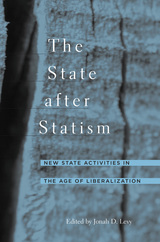
This book assesses the changing nature of state intervention in the economies of the affluent democracies. Against a widespread understanding that contemporary developments, such as globalization and new technologies, are pressing for a rollback of state regulation in the economy, the book shows that these same forces are also creating new demands and opportunities for state intervention. Thus, state activism has shifted, rather than simply eroded.
State authorities have shifted from a market-steering orientation to a market-supporting one. Chief among the new state missions are: repairing the main varieties of capitalism (liberal, corporatist, and statist); making labor markets and systems of social protection more employment-friendly; recasting regulatory frameworks to permit countries to cross major economic and technological divides; and expanding market competition at home and abroad.
Because the changes from market steering to market support are so controversial and far-reaching, state officials often find themselves making choices that produce clear winners and losers. Such choices require a capacity to act unilaterally and decisively, even in the face of substantial societal opposition. As a result, state activism, autonomy, and occasionally imposition remain essential for meeting the challenges of today's globalizing economy.

This book offers a new interpretation of the transformation of French economic policymaking and state-society relations over the past twenty-five years. In so doing, it challenges widely held views about the preconditions for state leadership and for a vibrant civil society.
France has long been characterized as a statist or dirigiste political economy, with state "strength" predicated on autonomy from a weak and divided civil society. Jonah Levy shows that this disdain for societal and local institutions has come back to haunt French officials--what he terms "Tocqueville's revenge." The absence of societal partners undermined the operation of dirigiste policymaking in the 1970s and early 1980s and has made it difficult to forge alternative forms of economic coordination in the post-dirigiste period.
Levy argues that just as the French state has been weakened by an absence of societal and local partners, French civil society has been weakened by the absence of a supportive state. In the 1980s, French authorities invited societal and local institutions to relay state intervention, but did little to cultivate their economic capacities. Taking the dirigiste state out of the French economy did not suffice to bring civil society back in, however. The broader lesson is that revitalizing civil society requires an active, empowering state, as opposed to an absent or indifferent state.

Transatlantic Policymaking in an Age of Austerity integrates the study of politics and public policy across a broad spectrum of regulatory and social welfare policies in the United States and several nations of Western Europe. The editors and a sterling list of contributors look at policymaking in the 1990s through the present—providing a comparative politics framework—stressing both parallel development and the differences between and among the nations. Similar prevailing ideas and political factors can be identified and transatlantic comparisons made—providing for a clearer understanding of the policymaking process.
Faith in regulated markets and the burden of rising welfare costs are concerns found on both sides of the Atlantic. Western democracies also share political climates colored by economic austerity; low trust in government, pressures from interest groups, and a sharply divided electorate. Because of differing political processes and differing policy starting points, a variety of disparate policy decisions have resulted.
Real world policymaking in the areas of welfare, health, labor, immigration reform, disability rights, consumer and environmental regulation, administrative reforms, and corporate governance are compared. Ultimately, the last decade is best characterized as one of "drift," sluggish changes with little real innovation and much default to the private sector. In general, policymakers on both sides of the ocean, constrained by economic necessity, have been unable to produce policy outcomes that satisfy the key segments of the electorate.
The contributors examine the United States, Great Britain, France, and Germany, as well as a number of other European countries, and study the European Union itself as a policymaking institution. Transatlantic Policymaking in an Age of Austerity distills the prominent issues, politics, and roles played by governmental institutions into a new understanding of the dynamics of policymaking in and among transatlantic nations.
READERS
Browse our collection.
PUBLISHERS
See BiblioVault's publisher services.
STUDENT SERVICES
Files for college accessibility offices.
UChicago Accessibility Resources
home | accessibility | search | about | contact us
BiblioVault ® 2001 - 2024
The University of Chicago Press









